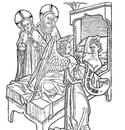Pope Francis has called for a human ecology that places the person at the center. This human ecology includes many things; respect for the dignity of the person, an understanding of the common good, and an appropriate stewardship of the earth and all creation. The language and concept of human ecology has been particularly developed under Popes Benedict and Francis and this makes sense, since it mirrors the global shift away from the language of “population control,” and “reproductive health.”
The magisterial focus on the development of a human ecology reveals the Papal understanding that modern man needs a new vocabulary with which to engage eternal truths, and highlights their awareness that the great problem confronting modernity is the Incarnation. The bodily reality of God-made-man confounds an Enlightenment and neo-rationalist world, which increasingly seeks to understand itself on its own terms, “[defining] one’s own concept of existence, of meaning, of the universe and of the mystery of human life,” as Justice Kennedy so memorably wrote.
The Church has always engaged the great debates of each age with language, imagery and reason suited to it. Thomas Aquinas argued with the neo-Manichaeans of his day (the Albigenses), stretching and developing new theological and philosophical capacities to do so. He understood that the heretic sets the debate; in love he went to them, to answer their objections on their own terms. In our own time, Pope John Paul II brought the modern language of Personalism into the Magisterium to expand the understanding of the human person to a world caught up in the lie of communism.
Just as language needs to change, so does the location of the fight. The early 90’s saw a clear and concerted attempt to impose population control standards on the world through a series of global conferences hosted by the United Nations. The 1994 International Conference on Population and Development in Cairo, convened by the UN through its population agency UNFPA (the UN Fund for Population Activities), served as the key inflection point in John Paul II’s confrontation with these global political forces. Cairo proposed a global agenda predicated on contraception, sexual education and abortion targets embraced by nation states; John Paul II, and his diplomatic corps, forcefully fought back, and won miraculously.
The Holy See victory at Cairo, which is undoubtedly John Paul II’s victory given his direct and immediate intervention at every stage, cannot be outlined in this brief space. What is important to note, though, is John Paul II’s recognition that the human person must be defended philosophically/theologically, as well as practically.
John Paul II’s victory at the international conference in Cairo in 1994 was preceded by the 1992 Rio Earth Summit. Hard fought work paid off; the first victory of the 90’s was the Holy See’s insertion of language recognizing the person as the center of development. In the face of the idea that more population control was necessary to save the environment, this one statement reset the whole Rio agenda.
The battle moved on to Cairo where the International Conference on Population and Development became a debate about population control. Abortion, contraception and sexual education were promoted as the way forward, rather than economic development. And in the midst of this, the language shifted. With developing nations no longer willing to accept population control targets as a focus of development, a new term arose: reproductive health. And with this new term the Holy See’s great victory at Cairo was to keep abortion out of its definition.
Twenty years later it has seemed to some as though the victory over ideas (and definitions) had become empty, since the foreign aid allocations for reproductive health have uniformly funded contraception and abortion programs.
To fight a conception of reproductive health that reduces women and their health to contraception and abortion, alternate reproductive health programs had to be provided. Sadly, they were not. Looking at women’s health now, in both developed and developing nations, the pill is prescribed to 2/3 women for management of health concerns, ranging from acne to depression, PMS, irregular bleeding, pain and migraines. Contraception has become identical with women’s health. Leaving aside the question about whether this approach is good medicine in the first place, until we can better treat the myriad of health conditions for which the pill is currently prescribed, women will continue to be on contraception for the management of their health and fertility.
Fertility Education & Medical Management (FEMM) is a new reproductive health program developed to fit this need. It teaches women (and girls) how their bodies work, enabling real informed consent. It provides support to women to understand and look at options for their health that will diagnose and treat the underlying condition, not just manage the symptoms (with the pill). What, for example, is the cause of that acne or depression? We need to find out. Only then can we diagnose and treat. Researching this information and providing it to doctors in clinical format is the work of FEMM and its sister organization, the Reproductive Health Research Institute.
Not surprisingly, it turns out that women prefer healthcare to contraception, and are eager to have the information they need to make healthier and better long-term choices. Once contraception is not synonymous with health care, the space of moral responsibility is re-opened, so that there can be a more human way of living sexuality towards “a more human way of living sexuality.” With FEMM, women are now free to consider other options for the management of their fertility as well as their health.
Investing in science, research and education through FEMM, is moving the understanding of women’s health forward. It is also changing the debate. Once women know that their underlying problems can be diagnosed and treated, they are eager and willing to make the required lifestyle changes. Emphasis on our obligation to be stewards of the environment is important, of course. But an understanding of human ecology as it pertains to the human person is a much greater impetus for moral change than a mere appeal to duty. FEMM does just that. It promotes the human ecosystem as an intrinsic element of who we are, and what it means to live lives of freedom in view of real human flourishing.
Anna Halpine is Founder of the World Youth Alliance and CEO of FEMM.



